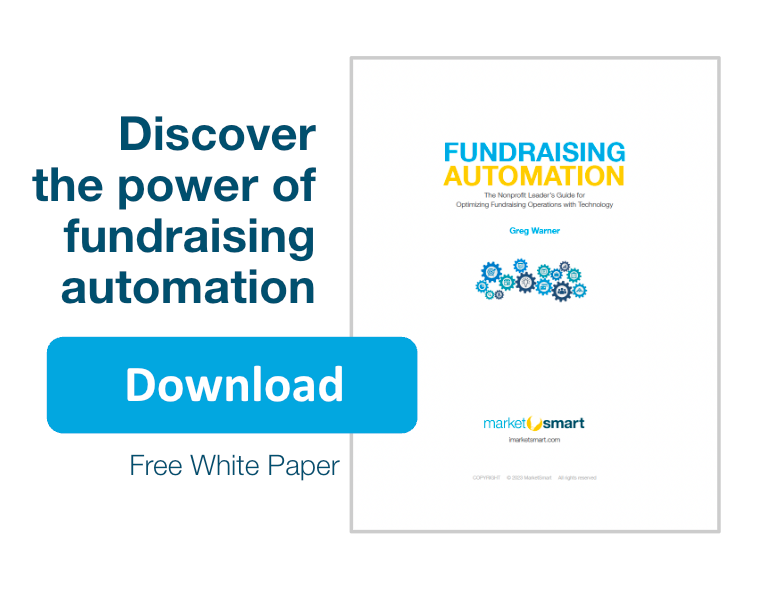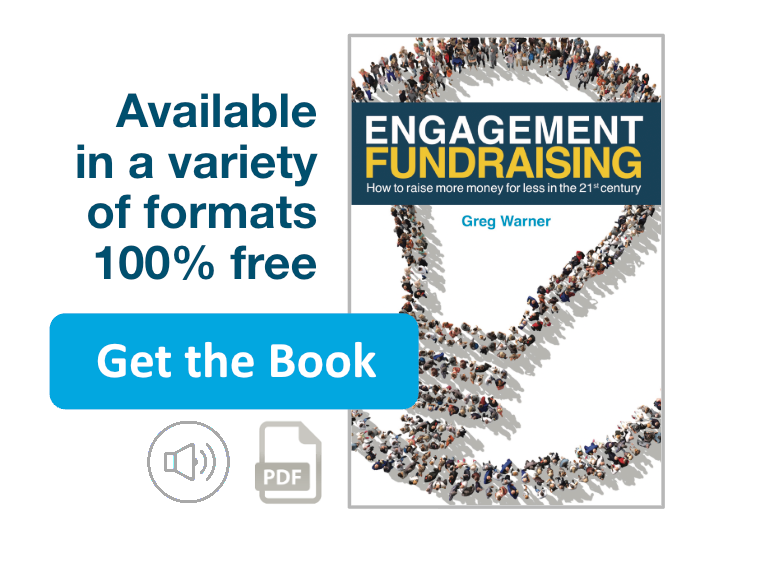Why Do Major Gifts Prospects Decide Not To Give?
In the vast majority of situations where this happens, the reason is because the fundraiser failed to learn about a supporter’s needs, rushed the ask, and missed opportunities to help the donor advance their personal hero story.
Giving is a revolutionary action. It is disruptive. It goes against the grain.
All our lives, we’re told to save our money, secure our futures, and prioritize how we spend for our families. Giving our money away goes against all that.
So, why do people give?
Because they want to be the hero in a story of transformation, discovery, rescue, rebuilding, liberation, advocacy, or whatever other outcome your organization delivers.
Your major donors don’t just want to watch that story on TV. They want to instigate it. They want to be at the center of it, ruffling feathers, overcoming barriers, fighting injustice, and changing lives.
Giving is drama. Giving is not a spectator sport. Donors want to be on the field in the fourth quarter when time is running out and the team is losing.
When your donors are led to feel like this about giving to your organization, they say YES.
If they say ‘no,’ it is usually because not enough was done before the ask to help get them to this point of self-realization. You didn’t yet inspire them with the thrill of giving big gifts.
Here Are 13 Specific Reasons For Why A Donor Turns You Down – Even Though They Agreed To Meet To Talk About Giving.
1. Bombarded with Transactional Solicitations
Major gifts fundraising isn’t like mass donation appeals. It’s relational, not transactional.
If your major donor prospects are on your general mailing lists and receiving all your general solicitations, it’s hard to switch from that to the personalized nature of major gifts. They’ve never considered giving assets, for example, and suddenly you’re talking about IRAs, life insurance policies, and planned giving.
The leap is too big.
If a major gift prospect has only recently been unearthed from your general mailing lists, you need to spend more time removing them from feeling like just another donor, and helping them discover how to tell their own personal hero story through giving.
2. Not Enough Trust
The fundraiser is like the sage, one of 12 character archetypes in literature, guiding the donor in advancing their hero story.
But going from being a total stranger asking for money from afar to a Sage takes time. That doesn’t happen in just one meeting. This is why major gifts cultivation typically takes many months, often years. If you haven’t earned their trust, you’re more likely to be turned down when you ask for a major gift.
3. Inadequate Donor Discovery
If you don’t know enough about a donor to treat them like a unique individual who can achieve their dreams and goals through giving – on their terms – then you will be at risk of coming across like a bad salesperson.
Donor discovery is at the heart of successful major gifts fundraising. The more you know before you meet the donor in person, the more personalized your conversations and recommendations will be. See how you can automate donor discovery so your gift officers can show up for each meeting ready to get personal, but without being burdened by all the extra work it takes to achieve that.
4. Failure to Elicit Social Emotions
Big gifts happen when the donor feels social emotions like empathy – feeling the perspective of someone else that is relatable to them in some way.
If you haven’t done enough to help your prospect feel profound levels of empathy and other social emotions, they’ll still be hobbled from giving because of logic, facts, figures, and assumptions they came in with.
5. You Went in Unprepared
Everyone has done this at least once. Consider it a learning opportunity, not a failure.
Sometimes lack of preparation happens because the fundraiser didn’t practice the ask, or just lacks experience. Other times, the organization didn’t do enough to prepare them for the job. It could also be a combination of both.
6. Your Organization Pressured You
Some organizations are unfortunately led by administrators or board members who apply unwise pressure to fundraisers to meet quotas, deadlines, or other artificial (or real) timelines that matter to them, but not to donors.
Major gifts cannot be rushed. If your organization is pressuring you to ask, ask, ask, call, call, call, get your metrics up, and by the way, why haven’t you asked this donor I referred to you for a gift yet – you’ve met with them five times this year?!
That mentality is pretty much guaranteed to generate a lot of rejection.
Major donors say ‘yes’ more often when they are allowed to give when and how it best suits their needs and timing, not the organization’s. They aren’t moved by your desperation, however real it may be. They are moved by their own story, and how giving enhances their identity and personal fulfillment.
7. They Haven’t Linked Their Life Story to Your Cause
When donors feel a symbiosis between their own lives and your organization and your cause, they will leap at the chance to give. But creating that bond takes time and skill. We only offer this course a few times per year, so if it’s not available right now, get on the waitlist.
8. Their Brain Is Distracted
Giving is emotional, not rational. But when the prospect’s brain is afflicted by rational and real life stresses, it’s hard to keep them focused on the emotional decision-making you’re trying to help them with.
Sometimes it’s just not the right time because life is in the way. You can’t control those distractions.
Other times, you may be inadvertently distracting them by triggering their brain’s rational error detection response, which activates their logical and analytical reasoning. These are antithetical to giving major gifts. Hit them with facts, figures, and hierarchies, and you will drive the desire to give right out the window.
9. The Cost Outweighs the Perceived Value
Giving transformational gifts is a significant life decision. It costs the donor something. Are you giving them value in exchange for that gift?
Different donors receive meaning and fulfillment in different ways. But everyone wants something. For some, it’s public recognition, which could be in an email, on the website, on a wall, or at an event. For others, it’s getting to meet someone whose life their gift will impact.
There are many other ways to deliver a valuable giving experience. You need to find out what each donor considers valuable, and meet them there. Knowing their donor archetype can provide you with insights into each donor’s perception of value.
10. No Sense of Urgency
What will happen if the donor says ‘no’? Do they have any sense of who or what their decision to not give will impact – for the worse? Who stands to lose if they don’t give? What won’t get accomplished?
Most importantly, have you communicated this?
Urgency isn’t just about timing. It’s about the effect of giving or not giving. A transformational gift is akin to the hero saving the day in the nick of time. If that hero doesn’t show up, life will be worse for everyone they could have saved. Does your donor feel that?
11. Unpleasant Prior Giving Experience
The donor may have once given a large gift, especially a gift of assets because that tends to be more complicated, but they didn’t have a good experience. This could have been with your organization or another. Doesn’t matter. The value they were expecting never materialized, and it made them more wary, more jaded, about making another big gift.
Had you done a better job in donor discovery, this sort of thing may have come up in advance and you could have planned for it.
12. Uncertainty About Your Organization
Maybe your organization has had a lot of turnover lately, or gotten some bad press. Maybe the donor worries that the amount of money you’re asking for seems like more than the organization can handle. This is a valid concern for smaller and mid-size organizations.
Internal or external turmoil can rattle donors and make them apprehensive about committing to a gift.
13. They Feel Like an Outsider
This is one aspect of the value you can deliver as part of the giving experience. A major gift donor may not be expecting or wanting control of anything in your organization. But they might want to feel involved in a greater way, or known and appreciated by the staff. They might want to be invited to certain meetings or events, like an anniversary celebration for the CEO or a special employee.
If they don’t feel like a partner, and instead feel like a checkbook, that means you should have done more up front to involve them in ways that are meaningful to them.
Overcome Major Donor Resistance with Donor Discovery
You can see that almost all the reasons why major gifts prospects say ‘no’ are preventable.
What you do in the weeks and months leading up to the meeting, and what you do during the meeting leading up to the ask – these actions (or inactions) play an enormous role in the percentage of prospects who decide to say yes and make a transformational gift that is at or above their giving capacity.
Donor discovery, when you qualify and cultivate your organization’s relationship with and understanding of each unique donor and prospect, is the single most important tool in your arsenal.
Do this well, before any solicitations or meetings, and your success percentage will go through the roof.
We have seen it happen over and over for so many organizations that are using our software.
Marketsmart Offers Tech-Enabled Donor Discovery, At Scale.
It’s donor discovery – but it’s automated. That means it doesn’t require extra work from your overworked team of administrators and fundraisers. It actually takes work off their plates, empowers your gift officers to do their jobs better, and reduces the number of times you encounter the 13 problems you just read about.
Is that worth 15 minutes of your time? See a demo of MarketSmart’s software.
And take note – we offer a 10:1 ROI guarantee on our technology and services.
That’s how much we know this works – we will guarantee that you will make ten times more in donations than you will spend on our service. It’s like hiring a virtual gift officer instead of a person, and this officer does all the work your human gift officers don’t like to do and don’t have time to do – but that someone needs to do.
Related Resources
- Why You Need Tech-Enabled Donor Discovery
- Why wealthy people care about cost even when it comes to philanthropy
- The 6 Core Elements of a Well-Told, Well-Executed Donor Fundraising Story
- The Fundraising Myth & Science Series, by Dr. Russell James





